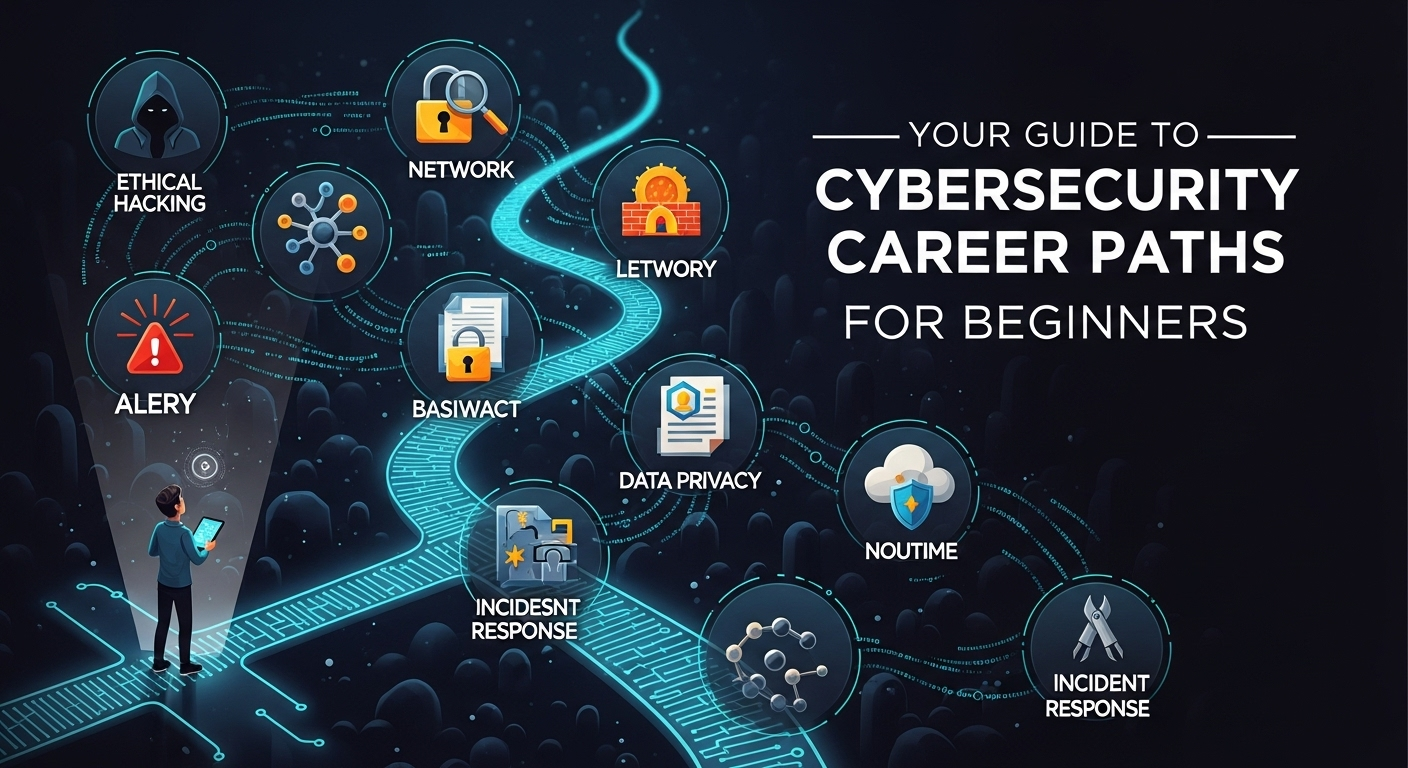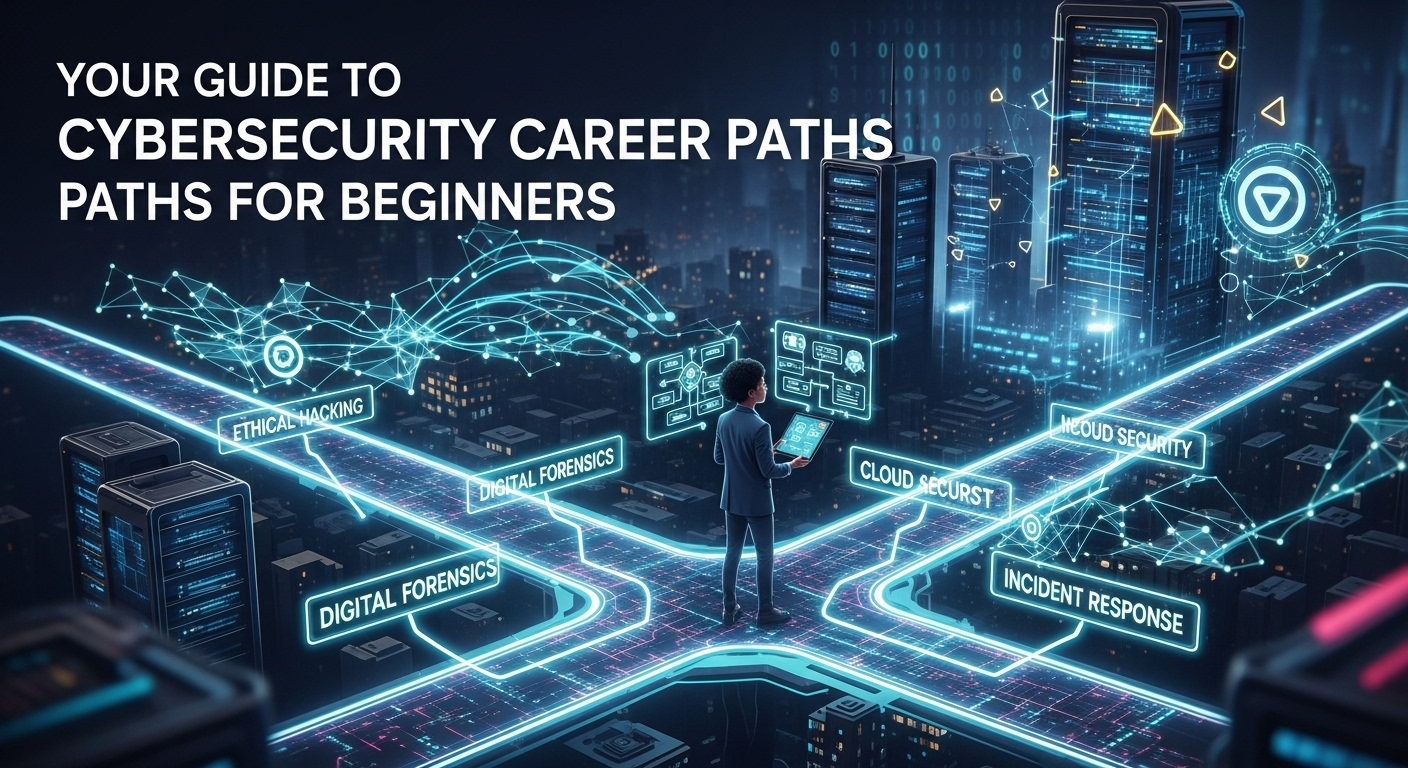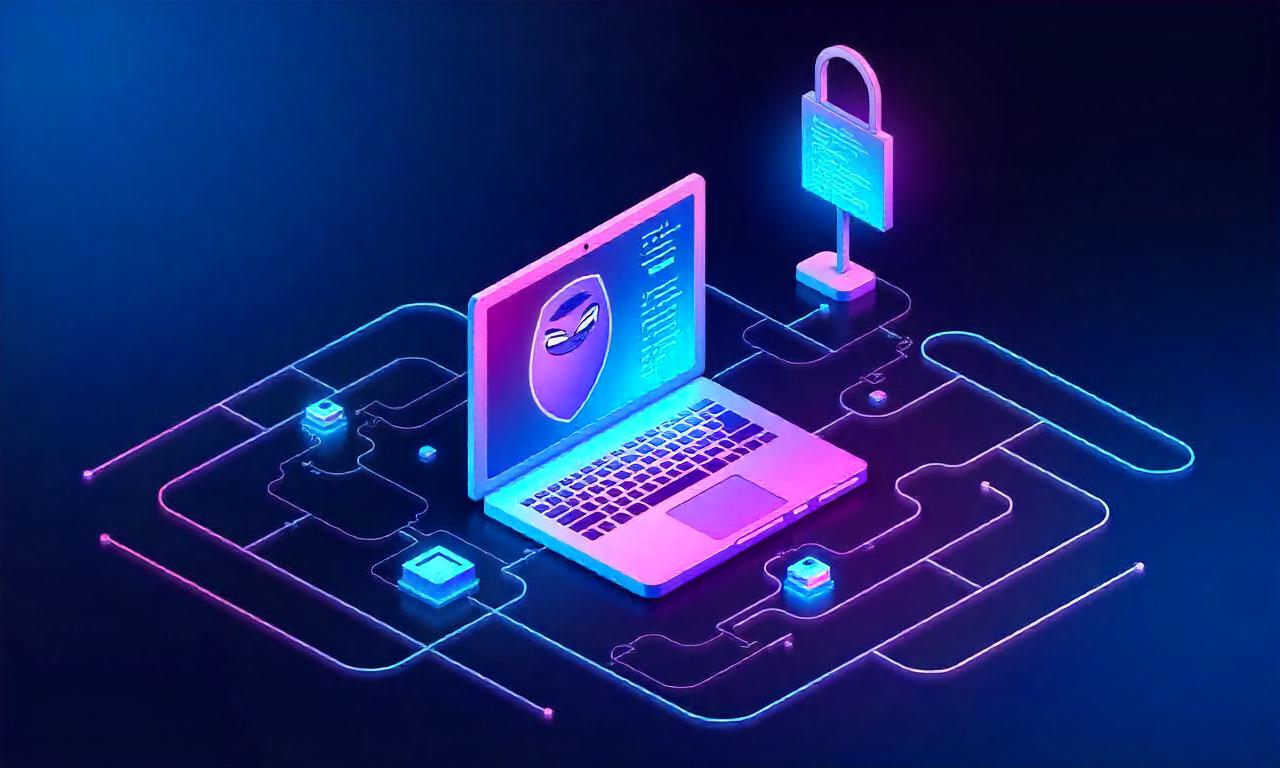In an increasingly digital world, the importance of protecting our data, systems, and networks has never been more critical. From personal banking information to national security secrets, everything is online and vulnerable. This has created a massive, and rapidly growing, demand for skilled professionals to defend against a relentless wave of cyber threats. For those looking to enter a dynamic, challenging, and rewarding field, exploring the various cybersecurity career paths for beginners is the first step toward a future-proof profession. This guide is designed to be your comprehensive map, illuminating the foundational skills, entry-level roles, and strategic steps you need to take to launch a successful career in cybersecurity.
Table of Contents
ToggleWhy Cybersecurity is a Booming and Essential Field
The digital landscape is in a constant state of evolution, and with every technological advancement comes new vulnerabilities. Cybercriminals, hacktivists, and state-sponsored actors are becoming more sophisticated, launching attacks that can cripple businesses, compromise personal privacy, and even disrupt critical infrastructure. This escalating threat level is the primary driver behind the explosive growth of the cybersecurity industry. Companies and governments are no longer asking if they will be attacked, but when, and they are desperately seeking qualified individuals to build and maintain their defenses.
The demand for cybersecurity talent far outstrips the current supply, creating what is known as a significant "skills gap." According to research from organizations like (ISC)², the global cybersecurity workforce needs to grow by millions to adequately defend critical assets. This imbalance creates a massive opportunity for newcomers. It means more job openings, higher starting salaries, and greater job security compared to many other industries. For anyone with a knack for problem-solving and a desire to make a tangible impact, the field is wide open and welcoming.
This high demand translates directly into financial incentives and long-term career viability. Cybersecurity is not a fleeting trend; it is a fundamental necessity of the modern world. As long as we use computers, phones, and the internet, the need to secure them will exist. This makes a career in cybersecurity one of the most stable and future-proof choices you can make. The profession offers a clear trajectory for growth, from entry-level analyst roles to executive positions like a Chief Information Security Officer (CISO), with compensation scaling significantly with experience and specialization.
Foundational Skills Every Aspiring Cybersecurity Professional Needs
Before diving into specific job roles, it's crucial to understand the foundational knowledge that underpins the entire field. Contrary to popular belief, cybersecurity isn't just about "hacking" in a dark room. It's a multidisciplinary field that requires a blend of technical expertise, analytical thinking, and strong communication skills. These core competencies are the bedrock upon which you will build your specialized career path, regardless of the specific role you pursue.
While technical skills are non-negotiable, one should never underestimate the power of soft skills. Cybersecurity professionals must be excellent problem-solvers, capable of thinking critically and creatively under pressure. Attention to detail is paramount, as a single misconfigured setting or overlooked log entry can lead to a catastrophic breach. Furthermore, you must be a clear and effective communicator. You will need to explain complex technical issues to non-technical stakeholders, write detailed incident reports, and collaborate effectively with a team. A strong sense of ethics and a continuous desire to learn are also essential personality traits for success.
On the technical side, a few key areas form the essential toolkit for any beginner. These aren't just abstract concepts; they are the practical skills you will use daily. Mastering these fundamentals will not only make you a more effective professional but will also make it significantly easier to learn more advanced, specialized topics later in your career. They are the language of cybersecurity, and fluency is a prerequisite for entry.
Networking Fundamentals
Understanding how computers and systems communicate is arguably the single most important foundational skill in cybersecurity. If you don't know how a network is supposed to work, you can't possibly identify when it's behaving abnormally or under attack. This involves a deep understanding of concepts like the TCP/IP model, DNS (Domain Name System), DHCP (Dynamic Host Configuration Protocol), and how routers, switches, and firewalls function to direct and filter traffic.
To a security professional, a network isn't just a way to access the internet; it's a battleground. You need to be able to analyze network packets to identify malicious activity, understand subnetting to properly segment and isolate critical systems, and configure firewalls to block unauthorized access. Certifications like the CompTIA Network+ are an excellent starting point for building and validating this essential knowledge. Without a strong networking foundation, you'll be navigating the world of cybersecurity with a blindfold on.
Operating System (OS) Knowledge
Every cyberattack ultimately targets a device running an operating system.
Therefore, having a solid grasp of the world's most common operating systems—Windows, Linux, and macOS—is not optional. This goes far beyond being a casual user. You need to understand the file systems, user permission models, command-line interfaces, and a process for "hardening" these systems to reduce their attack surface. Hardening involves disabling unnecessary services, implementing strong password policies, and configuring security settings to their most secure state.
For many security roles, Linux is particularly vital. A vast number of security tools, web servers, and cloud infrastructure run on Linux. Proficiency with the command line in a Linux environment (like using Bash for scripting) is a highly sought-after skill. It allows you to automate tasks, analyze logs efficiently, and run a wide array of open-source security tools that are the industry standard. Whether you are a security analyst or a penetration tester, you will spend a significant amount of time working within these operating systems.
Basic Programming and Scripting
While you don't need to be a full-fledged software developer to enter cybersecurity, having basic programming and scripting skills is a massive advantage. Scripting allows you to automate repetitive tasks, which is a lifesaver when you need to analyze thousands of log files or scan hundreds of devices. It also enables you to create custom tools to solve unique problems or modify existing ones to suit your needs.
Python has become the de facto language for cybersecurity due to its simple syntax, extensive libraries, and powerful capabilities. It's used for everything from writing simple automation scripts to developing complex malware analysis tools. Ngoài ra, Bash (for Linux/macOS) and PowerShell (for Windows) are essential for interacting with operating systems at a deep level and automating administrative and security tasks. Starting with Python and then learning either Bash or PowerShell depending on your area of focus is a solid strategy.
Exploring Entry-Level Cybersecurity Roles
Once you have a handle on the foundational skills, you can start exploring the various entry-level roles that serve as a gateway into the industry. These positions are designed for individuals with theoretical knowledge and some hands-on practice but limited professional experience. They are the proving grounds where you will apply your skills to real-world scenarios, learn from senior professionals, and begin to discover which areas of cybersecurity you find most compelling.
It's important to note that job titles can vary significantly between companies. A "Security Analyst" at one company might do the same work as a "Cyber Defense Analyst" or "SOC Analyst" at another. Therefore, it's crucial to read the job description carefully rather than just focusing on the title. Look for key responsibilities like monitoring, threat detection, incident response, and vulnerability scanning. These roles are your foot in the door, and performing well in one of them is the key to unlocking more advanced opportunities.
The following roles are some of the most common and accessible cybersecurity career paths for beginners. Each offers a unique perspective on defense and provides a solid foundation for future specialization. Let's explore what each role entails, the skills they require, and how they fit into the broader security landscape.
Cybersecurity Analyst / Security Operations Center (SOC) Analyst
Often considered the quintessential entry-level role, a Cybersecurity Analyst is the first line of defense. Working within a Security Operations Center (SOC), these professionals are the "eyes on the glass," constantly monitoring an organization's networks, systems, and applications for signs of malicious activity. They use a variety of tools, most notably Security Information and Event Management (SIEM) systems, which aggregate and correlate log data from across the enterprise.
When an alert is triggered, it's the analyst's job to investigate it. This involves triaging the alert to determine if it's a false positive or a genuine threat, analyzing data packets, and reviewing system logs to understand the nature of the event. If a threat is confirmed, they follow a predefined playbook to initiate the first steps of the incident response process, such as isolating an infected machine or blocking a malicious IP address. This role requires sharp analytical skills, attention to detail, and the ability to work well under pressure.
Penetration Tester / Ethical Hacker (Junior)
If analysts are the defenders, penetration testers (or "pentesters") are the ethical attackers. Their job is to think and act like a real-world adversary to find and exploit vulnerabilities in an organization's systems before a malicious actor does. This is a proactive and offensive approach to security. A junior pentester will typically work under the guidance of a senior team member, learning the methodologies and tools used to probe networks, web applications, and physical security.
This role requires a deep curiosity for how things work—and how they can be broken. Strong knowledge of networking, operating systems, and web application architecture is essential. Pentesters use a variety of tools like Nmap for network scanning, Burp Suite for web application testing, and Metasploit for exploitation. Crucially, ethical hacking requires a strong moral compass and strict adherence to a defined scope of engagement. Certifications like the CompTIA PenTest+ or the Certified Ethical Hacker (CEH) are often sought by employers for these roles.
Security Administrator
While an analyst monitors for threats and a pentester looks for vulnerabilities, the Security Administrator is responsible for building, configuring, and maintaining the security infrastructure itself. This is a more hands-on, implementation-focused role that ensures the organization's defensive tools are working correctly. They are the architects and maintainers of the digital fortress.
A Security Administrator's daily tasks might include configuring and managing firewalls, setting up and maintaining Virtual Private Networks (VPNs), managing user access controls and identity management systems, and applying security patches to servers and workstations. This role requires a strong understanding of network architecture and system administration. It bridges the gap between traditional IT and pure cybersecurity, making it an excellent entry point for those with a background in IT support or network administration.
| Role | Key Responsibilities | Core Skills | Potential Certifications |
|---|---|---|---|
| Cybersecurity Analyst | Monitoring SIEM alerts, threat triage, initial incident investigation, reporting. | Log analysis, SIEM tools, network traffic analysis, understanding of common attack vectors. | CompTIA Security+, CompTIA CySA+ |
| Penetration Tester (Junior) | Performing vulnerability scans, assisting in penetration tests, reporting findings. | Networking, operating systems, web applications, scripting (Python), use of testing tools. | CompTIA PenTest+, CEH, eJPT |
| Security Administrator | Configuring firewalls/VPNs, managing access control, patch management, system hardening. | Network administration, system administration (Windows/Linux), IAM principles. | CompTIA Security+, Vendor-specific certs (e.g., Palo Alto, Cisco) |
Building Your Cybersecurity Career Path: A Step-by-Step Guide
Launching a career in cybersecurity is a marathon, not a sprint. It requires a deliberate and strategic approach to learning, skill development, and professional networking. While the path may seem daunting, breaking it down into manageable steps can make the journey more approachable. The key is to build momentum through continuous learning and practical application.
This roadmap is not a rigid formula but a flexible framework that you can adapt to your own background, interests, and goals. Whether you are a recent graduate, a career changer from a non-technical field, or an IT professional looking to specialize, these steps will provide a clear direction. Remember, the most successful cybersecurity professionals are those who are lifelong learners, constantly adapting to the ever-changing threat landscape.

The journey involves more than just acquiring technical skills; it's also about building your professional identity. This includes gaining verifiable credentials, creating a portfolio of your work, and connecting with others in the field. By methodically working through these stages, you will not only become qualified for an entry-level role but will also position yourself for long-term success and growth.
Get Educated: Degrees vs. Certifications
A common question for beginners is whether to pursue a formal university degree or focus on industry certifications. The best answer is often a combination of both, but each has distinct advantages. A bachelor's degree in Computer Science, Information Technology, or a specialized Cybersecurity program provides a strong theoretical foundation, critical thinking skills, and a credential that is highly valued by many large organizations, especially for future leadership roles.
On the other hand, certifications are focused on practical, job-ready skills. They are designed to validate your knowledge of specific tools, technologies, and methodologies that you will use from day one on the job. For beginners, the CompTIA Security+ is considered the gold standard, providing a broad overview of essential security concepts. As you specialize, you might pursue others like the CompTIA CySA+ (for analysts) or the CISSP (Certified Information Systems Security Professional), which is a more advanced certification for experienced professionals. Certifications can often be a faster and more cost-effective way to get your foot in the door, especially for those changing careers.
Gain Hands-On Experience
In cybersecurity, theoretical knowledge alone is not enough. Employers want to see that you can apply what you've learned. Since you can't get professional experience without a job, you must create your own. Building a home lab is one of the best ways to do this. Using virtualization software like VirtualBox or VMware, you can create a network of virtual machines (e.g., a Windows client, a Linux server, and a security-focused OS like Kali Linux) to practice your skills in a safe, controlled environment.
Another fantastic way to gain practical skills is by participating in Capture The Flag (CTF) competitions and using online training platforms. Websites like Hack The Box, TryHackMe, and OverTheWire provide gamified environments where you can legally hack into vulnerable machines and solve challenges related to cryptography, forensics, and web exploitation. Documenting your solutions to these challenges in a blog or on GitHub serves as a powerful portfolio that demonstrates your skills and passion to potential employers.
Network and Build Your Personal Brand
You can be the most skilled candidate in the world, but it won't matter if no one knows you exist. Networking is crucial in the cybersecurity community. Create a professional LinkedIn profile and start connecting with recruiters, hiring managers, and professionals in the roles you aspire to have. Follow industry leaders and companies, and engage with their content to show your interest and knowledge.
Attend local cybersecurity meetups, BSides events, or larger conferences like DEF CON or Black Hat if possible. These are invaluable opportunities to learn and make personal connections. Additionally, build a personal brand. Start a blog where you write about your learning journey or do write-ups of CTF challenges. Contribute to open-source security projects on GitHub. This not only deepens your own understanding but also creates a public record of your expertise and dedication, making you a much more attractive candidate.
Advanced and Specialized Cybersecurity Career Paths
After spending a few years in an entry-level role, you will have gained invaluable experience and a clearer idea of which areas of security you enjoy most. At this point, your career path will begin to branch out into more specialized and senior roles. Specialization is key to advancing your career, as it allows you to become a true subject matter expert in a high-demand niche.
These advanced roles come with greater responsibility, more complex challenges, and significantly higher compensation. They often require a deeper level of technical expertise, and some, like leadership roles, demand strong business acumen and strategic thinking. Moving into a specialized area is a natural progression that builds upon the foundation you've established in your initial role.
The possibilities are vast, ranging from highly technical roles focused on cloud security or malware reverse engineering to strategic roles focused on risk and compliance. Below are just a few examples of the exciting and challenging paths your cybersecurity career can take.
Cloud Security Engineer
With the massive migration of IT infrastructure to cloud platforms like Amazon Web Services (AWS), Microsoft Azure, and Google Cloud Platform (GCP), the demand for Cloud Security Engineers has skyrocketed. This role focuses exclusively on securing cloud environments. It's a highly specialized and technical field that requires a deep understanding of both cloud architecture and security principles.
A Cloud Security Engineer is responsible for implementing and managing security controls within the cloud. This includes configuring Identity and Access Management (IAM) policies, securing virtual networks, implementing security for containers (like Docker and Kubernetes), and using cloud-native security tools to monitor for threats. This role requires you to stay on top of the rapidly evolving services offered by cloud providers and understand how to configure them securely.
Digital Forensics Investigator
When a major security breach occurs, the Digital Forensics Investigator is called in to pick up the pieces. This role is like being a digital detective. Their job is to investigate cybercrimes and security incidents by collecting, preserving, and analyzing digital evidence. The goal is to determine the "who, what, where, when, and how" of an attack.
This is a meticulous and highly technical discipline that requires a deep understanding of file systems, memory analysis, and data recovery techniques. Investigators must follow a strict chain of custody to ensure that the evidence they collect is admissible in a court of law. They use specialized forensic software like EnCase or open-source tools from the SIFT Workstation to uncover deleted files, analyze malware, and trace an attacker's footsteps through a compromised system.
Chief Information Security Officer (CISO)
The CISO is the highest-level security executive within an organization. This is not a hands-on technical role but a senior leadership position focused on strategy, governance, risk management, and compliance. The CISO is responsible for developing and implementing the entire enterprise-wide security program and communicating the organization's security posture to the board of directors and other executives.
Reaching the CISO level is a long-term career goal that requires a unique blend of deep technical understanding, strong business acumen, and exceptional leadership skills. A CISO must be able to translate technical risks into business impacts, manage large budgets, lead teams of security professionals, and navigate the complex legal and regulatory landscape of data protection. It is the pinnacle of the cybersecurity career ladder, representing the ultimate responsibility for an organization's security.
Frequently Asked Questions (FAQ)
Q: Do I need a computer science degree to get into cybersecurity?
A: No, it's not strictly necessary. While a degree in a related field is helpful and often preferred by larger companies, many successful cybersecurity professionals come from diverse backgrounds. Demonstrable skills, hands-on experience (from home labs and CTFs), and industry certifications like CompTIA Security+ can be just as, if not more, valuable for securing an entry-level job.
Q: What is the fastest way to get a job in cybersecurity?
A: There are no guaranteed shortcuts, but a focused approach can accelerate the process. Start by earning a foundational certification like CompTIA Security+. Simultaneously, build a home lab and practice on platforms like TryHackMe to gain practical skills. Document your work on a blog or GitHub to create a portfolio. Network actively on LinkedIn and attend local meetups. This combination of certified knowledge, proven skills, and professional networking is the most effective strategy.
Q: Is cybersecurity a stressful job?
A: It can be. Roles like Incident Responder or SOC Analyst can be high-pressure, especially during a major security incident. You are often on the front lines, dealing with active threats under tight deadlines. However, many roles, such as security auditor or policy writer, are less stressful. The field also offers immense job satisfaction from solving complex puzzles and protecting people and data from harm.
Q: How much can a beginner in cybersecurity expect to earn?
A: Salaries vary significantly based on location, certifications, and the specific company. However, due to the high demand, entry-level cybersecurity roles generally offer a competitive starting salary. In the United States, beginners in roles like a SOC Analyst can typically expect to earn in the range of $60,000 to $90,000 per year, with significant potential for growth as they gain experience.
Q: Which programming language is best for cybersecurity?
A: Python is widely considered the most versatile and valuable programming language for cybersecurity. Its simple syntax makes it relatively easy to learn, and its vast collection of libraries makes it powerful for automation, data analysis, penetration testing, and malware analysis. After Python, learning a shell scripting language like Bash (for Linux) or PowerShell (for Windows) is highly recommended.
Conclusion
Embarking on a career in cybersecurity is an investment in a future that is both challenging and incredibly rewarding. The field is not just a job; it's a mission to protect the digital fabric of our society. As you've seen, there are numerous cybersecurity career paths for beginners, each offering a unique entry point into this vital industry. From the vigilant monitoring of a Security Analyst to the proactive testing of an Ethical Hacker, there is a role to fit a wide range of interests and aptitudes.
The key to success is a commitment to continuous learning. The threat landscape never stands still, and neither can you. By building a strong foundation in networking, operating systems, and scripting, gaining hands-on experience, and actively building your professional network, you can position yourself as a strong candidate. The journey may require dedication and hard work, but the demand for skilled professionals ensures that your efforts will be well-rewarded with a stable, lucrative, and meaningful career. Your guide is now in your hands—the next step is yours to take.
***
Article Summary
This comprehensive guide, "Your Guide to Cybersecurity Career Paths for Beginners," serves as a detailed roadmap for individuals looking to enter the rapidly growing cybersecurity industry. The article begins by establishing the immense demand for security professionals, driven by the increasing volume and sophistication of cyber threats and a significant global skills gap. It then outlines the foundational technical and soft skills essential for any aspiring professional, emphasizing networking, operating systems, and scripting with Python.
The guide explores the most common entry-level roles, including the Cybersecurity Analyst, Junior Penetration Tester, and Security Administrator, detailing their responsibilities and required skills in a comparative table. It provides a step-by-step plan for building a career, covering the debate between degrees and certifications, the critical importance of gaining hands-on experience through home labs and platforms like TryHackMe, and the value of professional networking. The article also looks ahead to advanced, specialized career paths such as Cloud Security Engineer and Digital Forensics Investigator, culminating in the executive-level CISO role. Finally, a dedicated FAQ section addresses common beginner questions, and the conclusion reiterates the field's stability and opportunity, encouraging readers to start their learning journey.
















